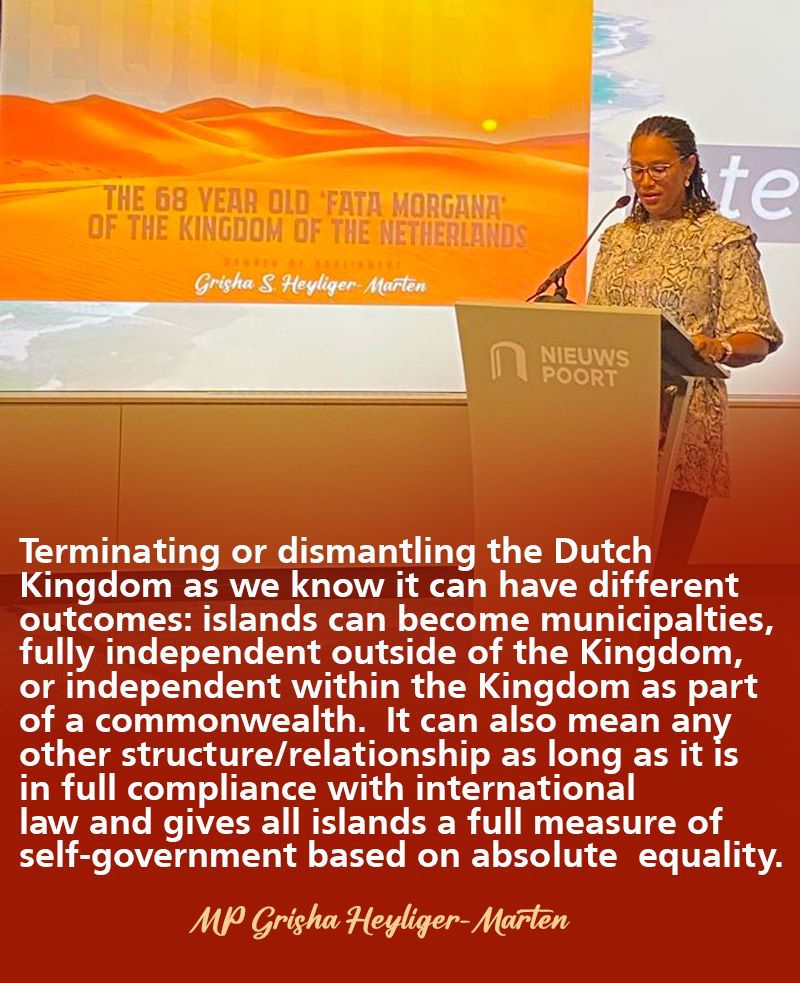MP Heyliger-Marten calls for independence
PHILIPSBURG – “The only realistic alternative to remaining in this dysfunctional Kingdom relationship is for the relationship to be terminated,” independent MP Grisha Heyliger-Marten stated in an opinion piece published on DossierKoninkrijksrelaties.nl. “This would mean dismantling the entire kingdom as we know it. Personally and realistically speaking, and looking back on how we got here, I believe it would be better for everybody in the Dutch kingdom to work towards this alternative as soon as possible.”
Heyliger-Marten characterized the kingdom as “a 68-year old fata morgana” that is “finally disappearing in front of our eyes.”
The MP presented her historical review of the establishment of the Kingdom Charter to the general assembly of the United Nations in 1954, saying that the Dutch term “gelijkwaardigheid” had been erroneously translated into equality.
That the relationship between the Netherlands, the largest partner in the kingdom, and the Caribbean islands is unequal is beyond dispute.
The Council of Ministers of the Netherlands dominates the Kingdom Council of Ministers. Its Caribbean representatives are routinely overruled and they have no veto power.
Heyliger-Marten pointed to Suriname that opted for independence in 1975 and to Aruba, that acquired its status aparte in 1986, but stopped short of going completely independent.
Another sore point is obviously the Dutch refusal to agree to a dispute regulation.
While the Caribbean islands hammer on equality, the Dutch government sticks to the term equivalence (gelijkwaardigheid). Heyliger-Marten quoted George Orwell’s Animal Farm: All animals are equal but some animals are more equal than others.”
In terms of using double standards, Heyliger-Marten referred to the dispute about the payment of damages in the so-called Corallo-ruling. (The European Human Rights Court held the Netherlands liable for the payment of damages to casino-owner Francesco Corallo because of his unjust detainment awaiting his deportation to Italy; the Netherlands refused to pay and argued that St. Maarten has to foot that particular bill).
Heyliger-Marten stated that State Secretary Alexandra van Huffelen has acknowledged that there is no equality between the governments in the kingdom. ‘Thus she has put an end to the equality debate and confirmed that all of us have been chasing an illusion for the past decades.”
Heyliger-Marten emphasized that these is a need for structural solutions, because the current relationships between the Dutch and the Caribbean parts of the kingdom are not working, “and will never work.”
The MP stated that the focus ought to be on amending the Kingdom Charter in such a way that it complies with all international law. She referred to recommendations made by CERD (Committee on the Elimination of Racial Discrimination) from 2021. One of these recommendations is ensuring the participation of Caribbean partners in decision-making processes that are of particular concern to them.
The motions De Graaf and Van Raak that were approved by the Dutch parliament should be executed post haste, Heyliger-Marten stated.
D66 MP Thom de Graaf’s motion (of June 21, 2016) asked the government for an evaluation of the Kingdom Charter and to consult the other countries in the kingdom and the island-governments of Caribbean Netherlands in this process.
The Van Raak motion (submitted in 2019) asks the government to clarify the responsibilities of the four countries in the kingdom.
The Netherlands also ought to execute a motion submitted by parliamentarians Jorien Wuite and Lammert van Raan. This motion urges the government to organize a kingdom conference in 2023 about the Kingdom Charter, the Union law (Unierecht) in relation to the Kingdom, human rights, climate change, strengthening the economy and regional and international cooperation.
According to Heyliger-Marten, such a conference should be “high on the agenda of the first IPKO (Inter-Parliamentary Kingdom Consultation) in 2023.”
Heyliger-Marten offered two possible solutions. The first one is the creation of “absolute equality between the government and people within the kingdom” and full compliance with article 73 a-d of the UN Charter.
The second option: dismantling the kingdom and terminating St. Maarten’s relationship with it. In other words: independence.
What the opinion piece does not say is that St. Maarten has complete control over a possible decision to become independent. To achieve this, the parliament in Philipsburg would have to organize a referendum. In spite of several calls to do this, the parliament has so far shown little enthusiasm for that initiative.
###
Related articles:
Opinion piece: Be careful what you wish for
Opinie – Equality – the 68 year old fata morgana of the Kingdom of the Netherlands
Opinie – Gelijkwaardigheid binnen Nederland
Column – De hypocrisie regeert



























